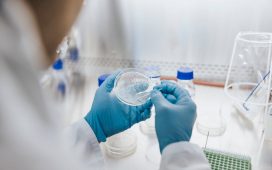Simply blowing into a bag at a GP’s surgery could show that a patient has cancer. That is the aim of an ambitious new project that is going through its final clinical trials in the UK. If successful, cancer breath tests could be used in a few years in order to pinpoint a range of tumours in the early stages of their development.
The technique is primarily aimed at detecting cancers of the gut, including those of the oesophagus, stomach, pancreas and colon, but could also be used to pinpoint cases of liver cancer. In total, these tumours formed more than 20% of all cancer cases in the world, said the project’s leader, Prof George Hanna of Imperial College London. “We have been working on this technique for more than 15 years and have now reached the stage where we are going through final clinical trials,” he told the Observer.
“If these are successful, we could see cancer breath tests deployed in doctors’ surgeries in a few years.”
Hanna said the test exploited the fact that various volatile compounds in the gut changed concentration when a tumour started to grow there. “Some volatiles increase, some decrease as cancer develops,” he said. “We have picked a panel of 15 of these chemicals which are particularly responsive to the arrival of a tumour.
“When these volatiles change in concentration, that affects amounts that are exhaled. By collecting them and analysing them using special algorithms, we can pinpoint which kind of tumour is forming.”
After a patient breathes into a bag, their exhaled air is transferred to stainless steel tubes and the gases are passed over an absorbent material. This material is then placed in a mass spectrometer where levels of the different volatiles can be measured.
“We can detect these materials in tiny amounts – down to a few parts per billion,” added Hanna. “Depending on variations we reveal this way, we can then tell if someone has cancer of the oesophagus, stomach, pancreas, colon or liver.”
The prime aim of this technology will be to streamline procedures for patients who currently have to undergo tests that can be lengthy, invasive and costly. By contrast, breath tests will give very quick answers. As the system is likely to be automated, it will also be relatively inexpensive. Once a positive result was produced, the patient would then be sent for further confirmation of their diagnosis before treatment began.
Hanna said: “We have been working on this technique for a long time and have shown it works in early clinical trials. Now we have larger-scale clinical trials in more than 20,000 patients that will take place over the next three years. In other words, we are now doing the definitive trials. After that, we will need to get regulatory approval. So I anticipate that it will take another five years or so before we get cancer breath tests up and running in GP surgeries.
“It is a technology that has certainly been in development for a long time but, if you think about it, it is a logical aim. Dogs can smell cancers in humans. In addition, we have breathalysers that can detect chemicals in the breath. So creating cancer breath tests was an inevitable goal.”
Hanna is planning to give public demonstrations of cancer breath-test technology at the Great Exhibition Road festival which will be held in London on 17-18 June. “We won’t actually be testing people for cancer. However, we will be showing how easy it could be to take the breath tests.”






